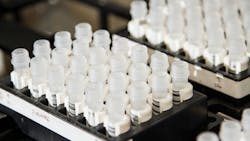Ceres Nanosciences establishes 6 wastewater epidemiology centers
Ceres Nanosciences, a private science research and diagnostic testing company, has announced the establishment of six new wastewater-based epidemiology centers of excellence.
The new centers add to the company's ten previously-established centers, and are supported by an $8.2 million award from the National Institutes of Health (NIH) Rapid Acceleration of Diagnostics initiative.
These sixteen sites encompass non-profit, university, public health, and commercial testing labs located in fourteen states, including: Arizona, California, Connecticut, Illinois, Georgia, Kansas, Kentucky, Louisiana, Maryland, Massachusetts, New York, Texas, West Virginia, and Wisconsin. The sites are also providing wastewater testing services to forty states.
The centers are regularly monitoring wastewater from a wide range of sources, including from wastewater treatment plants to provide information on overall virus trends in a county or city; from sewersheds to support decision-making for public health resource allocation at a neighborhood level; and from building-level locations like college dorms, skilled nursing facilities, correctional facilities, K-12 schools, summer camps, and airports.
Ceres Nanosciences says that each center was selected based on its ability to utilize the expanded capacity to extend services into underserved and underprivileged communities. Each center is also expected to share results with local and state public health authorities, as well as to submit data to the CDC National Wastewater Surveillance System.
Each center of excellence received the materials and on-site training to implement an automated Nanotrap® particle protocol, which enables same-day delivery of wastewater testing results for over 100 samples per day. Extracted nucleic acids from this automated protocol are compatible with multiple nucleic acid detection methods, including reverse transcription-quantitative polymerase chain reaction (RT-qPCR), reverse transcription-droplet digital PCR (RT-ddPCR), and genomic sequencing.
"The wastewater testing capacity that this NIH-funded program has established nationwide is proving critical for monitoring the rise of new SARS-CoV-2 variants," said Ben Lepene, chief technology officer at Ceres Nanosciences. "I'm also very excited by the data we are seeing that demonstrate that the same method can be used to enable wastewater monitoring of a much wider range of infectious disease, including other viruses, bacteria, and parasites."
